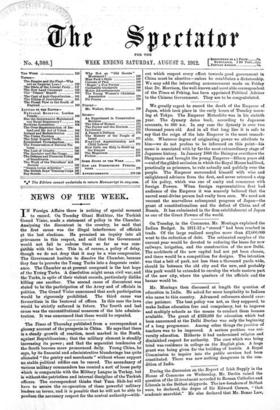We greatly regret to record the death of the Emperor
of Japan, which took place in the early hours of Tuesday morn- ing at Tokyo. The Emperor Mutsuhito was in his sixtieth year. The dynasty dates back, according to Japanese accounts, to 660 B.C. In any case the dynasty is over two thousand years old. And in all that long line it is safe to say that the reign of the late Emperor is the most remark- able. Whatever degree of originating power we attribute to him—we do not profess to be informed on this point—his name is associated with by far the most extraordinary stage of Japanese history. In January 1868 the Daimyos overthrew the Shogunate and brought the young Emperor—fifteen years old —out of the gilded seclusion in which the Royal House had lived, practically as prisoners, to rule actually and publicly over the people. The Emperor surrounded himself with wise and enlightened advisers from the first, and never retraced a step of his policy, which was one of amity and commerce with foreign Powers. When foreign representatives first bad audience of the Emperor it was scarcely believed that the sacred semi-divine person had really been seen. We need not recount the marvellous subsequent progress of Japan—the grant of constitutionalism and the defeat of China and of Russia. It has culminated in the firm establishment of Japan as one of the Great Powers of the world.




































